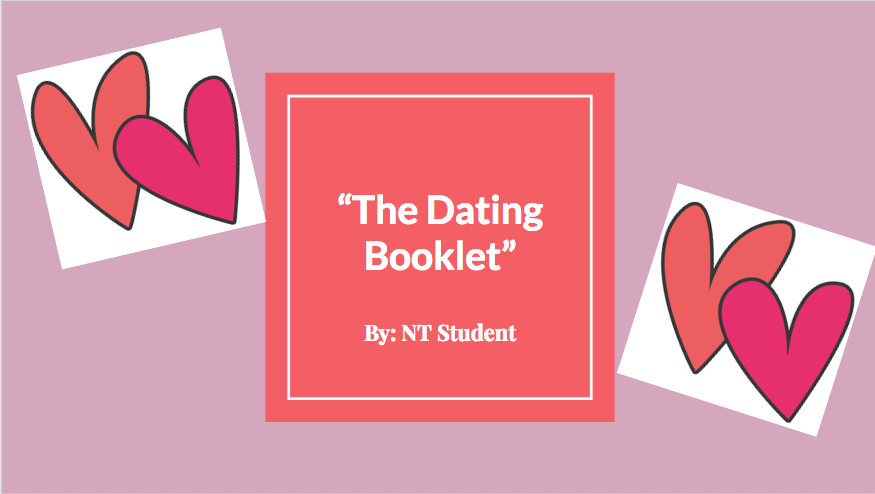Dating Booklet questioned over LGBTQ+ inclusivity
Sophomore health class project aims to teach healthy relationships
Over the course of the sophomore health curriculum, students focus on healthy relationships, with many KW teachers using the “Dating Booklet,” an assignment to help illustrate positive relationships.
Andy Horne, the coordinator for sophomore health, finds that the booklet helps him and other teachers to get students to effectively think through their relationships.
“We get them to think about what they would do on these dates, how would they look, what should someone wear, who is your ideal partner,” Horne explained.
Despite its positive intentions, for some students, especially within the LGBTQ+ community, the Dating Booklet is a far more challenging project.
Matt Stuczynski, a head sponsor of CTA, notes that for a member of the LGBTQ+ community, the booklet forces them to either out themselves or construct a false narrative to conceal their identity.
Stuczynski pointed out, “often when the topic of homosexuality or other sexual orientations come up, the health curriculum has then treated those kids as the ‘other.’”
Stuczynski explained, “I think [the dating booklet] could be very difficult, I would even say traumatic. It puts in their face that you’re not normal, because the norm is assumed to be you’re dating and you’re dating an opposite sex person.”
Sophomore Annie Thornton, an openly gay student, emphasizes the weight of covering up one’s identity.
“It’s depressing having to act straight or act like you are in a straight relationship. It’s depressing because you know that’s not who you are. It just makes you feel like being gay is weird or strange,” said Thornton.
Thornton reflected that had she been assigned the Dating Booklet in the past, it would have only made her experience more difficult: “It probably would have confused things more, it would have made me anxious and less willing to come out.”
To Amy Offenbach, a social worker leading several LGBTQ+ group meetings, the prospect of writing about an identity that is not your own is something all students will experience.
Offenbach pointed out, “we all are put into positions where we have to at some point try to relate to a life situation that doesn’t pertain to us. I don’t necessarily think the problem is that you are trying to come up with an idea that doesn’t pertain to you.”
Horne agreed, “even if you’re not interested in dating, there is a good chance you will be in the future.”
Senior Elza Wu agreed with Offenbach and said she used the booklet as an experimental learning device.
“I didn’t really feel like it was that important to be in a relationship, but after doing it [the Dating Booklet] and doing research on how other people think about it I can be like, ‘oh this person has different view point from me, I should respect them.’”
While some students are able to separate themselves from the project, others feel uncomfortable with the subjects the dating book pries at, regardless of sexual preference.
Sophomore Jordan Andrews considers the booklet to be an unwarranted search of students’ personal lives.
“Dating is one of those intimate things that doesn’t have to be regulated by the school,” Andrews argued, and continued, “I don’t think it is necessary for a teacher at our school to know our sexual preferences.”
Sophomore Lyla Friedman agreed, “I feel uncomfortable opening up with something so personal to a teacher.”
Some students, however, have found the booklet to be useful, in part because of its personal content.
Senior Katie Maatman primarily used the skills she learned from the dating booklet in her junior year when she started dating her current boyfriend.
“If I saw or noticed something that wasn’t great I knew it was a warning,” Maatman said.
While the overall health curriculum has undoubtedly helped to guide countless students, Thornton and others note the ever present need for growth within our curriculum.
“They are doing a lot more than other schools, and I do applaud them for that, but there is always room for improvement,” Thornton concluded.
Horne echoed this notion saying, “I want to make this [the Dating Booklet] better, if it can be better, and maybe we have to scrap certain parts of it.”
Stuczynski has found that within meetings, “health class comes up all the time, it’s one of the most common complaints where they [students] feel least comfortable and singled out as being different.”
Stuczynski explained, “even here at New Trier where things are relatively good, and things are relatively comfortable and supportive for gay kids, it’s still hard.”






































